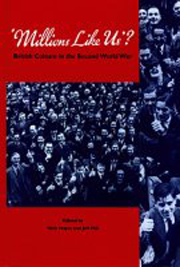Book contents
- Frontmatter
- Contents
- List of Figures and Tables
- Notes on Contributors
- Acknowledgements
- An ‘English War’, Wartime Culture and ‘Millions Like Us’
- British Cinema and ‘The People's War’
- The People's Radio: The BBC and its Audience, 1939–1945
- Was it the Mirror Wot Won it? The Development of the Tabloid Press During the Second World War
- A More Even Playing Field? Sport During and After the War
- A Time for Hard Writers: The Impact of War on Women Writers
- Safe and Sound: New Music in Wartime Britain
- More Than ‘Music-While-You-Eat’? Factory and Hostel Concerts, ‘Good Culture’ and the Workers
- ‘When Work Is Over’: Labour, Leisure and Culture in Wartime Britain
- Not Just a Case of Baths, Canteens and Rehabilitation Centres: The Second World War and the Recreational Provision of the Miners' Welfare Commission in Coalmining Communities
- ‘You and I – All of Us Ordinary People’: Renegotiating ‘Britishness’ in Wartime
- Postscript: A War Imagined
- Index
Was it the Mirror Wot Won it? The Development of the Tabloid Press During the Second World War
- Frontmatter
- Contents
- List of Figures and Tables
- Notes on Contributors
- Acknowledgements
- An ‘English War’, Wartime Culture and ‘Millions Like Us’
- British Cinema and ‘The People's War’
- The People's Radio: The BBC and its Audience, 1939–1945
- Was it the Mirror Wot Won it? The Development of the Tabloid Press During the Second World War
- A More Even Playing Field? Sport During and After the War
- A Time for Hard Writers: The Impact of War on Women Writers
- Safe and Sound: New Music in Wartime Britain
- More Than ‘Music-While-You-Eat’? Factory and Hostel Concerts, ‘Good Culture’ and the Workers
- ‘When Work Is Over’: Labour, Leisure and Culture in Wartime Britain
- Not Just a Case of Baths, Canteens and Rehabilitation Centres: The Second World War and the Recreational Provision of the Miners' Welfare Commission in Coalmining Communities
- ‘You and I – All of Us Ordinary People’: Renegotiating ‘Britishness’ in Wartime
- Postscript: A War Imagined
- Index
Summary
An anecdote related by the former editor of Picture Post, Tom Hopkinson, remains many years later a potent symbol of the supposed radicalization of the British electorate in the first half of the 1940s, which has given a particular significance to the Second World War as ‘the people's war’. Following the general election of 1945 Hopkinson was accosted by a Conservative politician who insisted that it was Hopkinson's weekly illustrated magazine which had secured Labour's huge success. Hopkinson demurred: the Daily Mirror newspaper had been far more influential, he felt. The story continues to have currency, and the idea that a left-wing press, in particular a combination of Picture Post and the Mirror, played a crucial role in establishing the agenda for post-war reconstruction has proved remarkably resilient.
Contemporaries certainly believed that the press helped mobilize public support behind a project which some on the right saw as taking Britain ‘half-way to Moscow’. George Orwell argued that the press had been able to play this role because, as the war economy was focused away from personal and household consumption, the power of advertisers and other commercial interests over the press waned, leaving them more ‘controlled by journalists’. As a result, Orwell sometimes felt the press demonstrated ‘how very much more thoughtful and also “left-wing” the non-highbrow public has grown’. Not all ‘the sensational nonsense’, ‘stunt make-up’ or ‘screaming headlines’ had been eliminated, but it did seem possible to contemplate the arrival of a moment of cultural reformation.
- Type
- Chapter
- Information
- Millions Like Us?British Culture in the Second World War, pp. 93 - 124Publisher: Liverpool University PressPrint publication year: 1999

